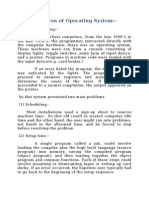0% found this document useful (0 votes)
805 views15 pagesJob Scheduling Problem
This document describes the job scheduling problem and provides a greedy algorithm solution. It begins by defining the problem of scheduling jobs with deadlines and profits to maximize total profit. It then describes a greedy approach that sorts jobs by decreasing profit and schedules the most profitable jobs in empty time slots respecting deadlines. An example is provided and the solution schedules jobs [J2, J1, J3] for maximum profit of 180. Finally, C code is provided to implement the greedy algorithm with time complexity of O(n^2).
Uploaded by
Akash KataraCopyright
© © All Rights Reserved
We take content rights seriously. If you suspect this is your content, claim it here.
Available Formats
Download as PDF, TXT or read online on Scribd
0% found this document useful (0 votes)
805 views15 pagesJob Scheduling Problem
This document describes the job scheduling problem and provides a greedy algorithm solution. It begins by defining the problem of scheduling jobs with deadlines and profits to maximize total profit. It then describes a greedy approach that sorts jobs by decreasing profit and schedules the most profitable jobs in empty time slots respecting deadlines. An example is provided and the solution schedules jobs [J2, J1, J3] for maximum profit of 180. Finally, C code is provided to implement the greedy algorithm with time complexity of O(n^2).
Uploaded by
Akash KataraCopyright
© © All Rights Reserved
We take content rights seriously. If you suspect this is your content, claim it here.
Available Formats
Download as PDF, TXT or read online on Scribd
/ 15
























































































